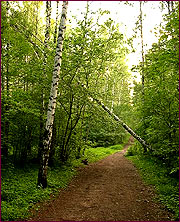 Russia
is a beautiful country and you will enjoy your trip. At the
same time it's quite different from other tourist destinations
and you should plan your visit carefully. Russia
is a beautiful country and you will enjoy your trip. At the
same time it's quite different from other tourist destinations
and you should plan your visit carefully.
First question that you will face when starting to plan
your trip - what is the best season to come to Russia. There
are no doubts, you'd better go in summer. Summer in Russia lasts
from June to August. July and August are the warmest months
and the main holiday season. If you are going to Siberia or
Far East, the most beautiful weather there is in September.
|
 Winter
travels have their special charm, but you'd better don't try
if you are not used to subzero temperatures. Winter
travels have their special charm, but you'd better don't try
if you are not used to subzero temperatures.
Rains in Russia are usual for any season, except winter,
so take an umbrella with you. Even in summer the temperature
sometimes is only +3...+5 degrees C, and warm clothes (jacket
and sweaters) are necessary. Russians are not fond of shorts,
you'd better take jeans.
|
Russia is a vast and diverse
nation that continues to evolve politically and economically.
Travel and living conditions in Russia contrast sharply with
those in the Europe and North America. Major urban centers show
tremendous differences in economic development compared to rural
areas.
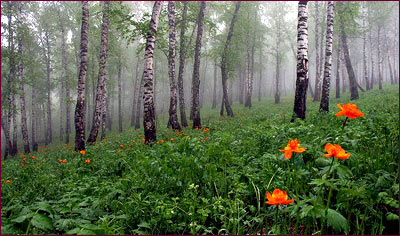
|
While good tourist facilities
exist in Moscow, St.
Petersburg and some other large cities, they are not developed
in most of Russia and some of the goods and services taken for
granted in other countries are not yet available. Petty crime
affects foreigners in large urban centers. Travel to the Caucasus
region of Russia is dangerous. Travelers may need to cross great
distances, especially in Siberia and the Far East, to obtain
services from Russian government organizations.
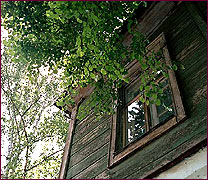 Aeroflot
has been broken up into many small airlines, leading to virtually
unregulated skies and the worst regional safety record in the
world. Flying within Russia is an unreliable, unpredictable
and difficult business. Try to get a seat on a domestic flight
that ultimately has an international destination, because these
carriers are certified to meet higher standards than domestic-only
services. Aeroflot
has been broken up into many small airlines, leading to virtually
unregulated skies and the worst regional safety record in the
world. Flying within Russia is an unreliable, unpredictable
and difficult business. Try to get a seat on a domestic flight
that ultimately has an international destination, because these
carriers are certified to meet higher standards than domestic-only
services.
European Russia is crisscrossed by an extensive rail
network that makes trains a viable means of getting to practically
anywhere. They're cheap and comfortable and usually take a
long, long time. The rail network runs on Moscow time; the
only general exception is suburban train services, which stick
to local time.
Driving in Russia isn't everybody's cup of tea but,
if you've got a sense of humour, don't mind some fairly rugged
road conditions, a few hassles finding petrol, and getting
lost now and then, it's a great way to see the country.
Tourism in Russia: approximately 7 million visitors
per year.
|

|
Traditions
 One
of the most prominent Russian traditions is hard drinking. It
does not mean they all are alcoholics; Russians are just drinking
more alcohol when they are drinking. One
of the most prominent Russian traditions is hard drinking. It
does not mean they all are alcoholics; Russians are just drinking
more alcohol when they are drinking.
It's applicable more in particular to men though women
also drink much more than it's accepted on the West. Drinking
a bottle of vodka for three, or a bottle of vine for each is
normal and is not considered as excessive.
Refusing to drink, as much as the rest of the company
is considered disrespect. The favorite men's drink is Russian
vodka, the favorite women's drink is Soviet Champagne - a decent
Russian sparkling vine.
|
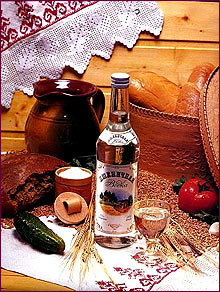 Drinking
until one falls is all right. The parties usually take place
in private flats, and majority of the guests stay to sleep overnight
occupying all free space on coaches and the floor. The next
morning the party may continue. "The morning after the
night before" condition, named in Russian "pokhmel'ie",
is supposed to be cured by drinking a small amount of alcohol
("opokhmelitsya"). It does provide some relief but
thereafter people usually can't stop. Small shops on the streets
(kiosks) selling mostly alcohol and chocolate, work 24 hours
7 days a week, and the party can get extra drinks any time if
they think they do not have enough. Drinking
until one falls is all right. The parties usually take place
in private flats, and majority of the guests stay to sleep overnight
occupying all free space on coaches and the floor. The next
morning the party may continue. "The morning after the
night before" condition, named in Russian "pokhmel'ie",
is supposed to be cured by drinking a small amount of alcohol
("opokhmelitsya"). It does provide some relief but
thereafter people usually can't stop. Small shops on the streets
(kiosks) selling mostly alcohol and chocolate, work 24 hours
7 days a week, and the party can get extra drinks any time if
they think they do not have enough.
|
Russian joke
( A diary of a foreigner working in Russia)
June 24 2002.
Was drinking with Russians. I think I almost died.
June 25 2002.
Was drinking with Russians. I think I'd better die.
June 26 2002.
In the morning came Russians, and offered a drink.
Why I didn't die yesterday?
|
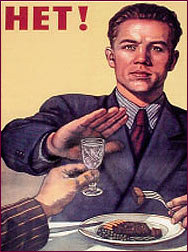 Russian
drinking traditions are very much a cultural thing, and the
person who drinks and does not become drunk is always respected.
It's called "he can drink". The more you drink and
don't fall down drunk, the more your friends will respect you.
Many business deals are solved while drinking together, it's
probably one more reason why women don't succeed in making careers. Russian
drinking traditions are very much a cultural thing, and the
person who drinks and does not become drunk is always respected.
It's called "he can drink". The more you drink and
don't fall down drunk, the more your friends will respect you.
Many business deals are solved while drinking together, it's
probably one more reason why women don't succeed in making careers.
Drinking alone is considered as being an alcoholic, drinking
in company is encouraged.
|
Russians don't usually drink without a
reason. It does not mean that they do not drink just when they
want, it means that every time they want to drink they bring
up a reason. It can be anything - from buying a new thing (in
this case they call it "obmyt" - in literal translation
"to wash" the new thing) to celebrating the weekend.
70% of Russian alcohol spend goes on cheap vodka.
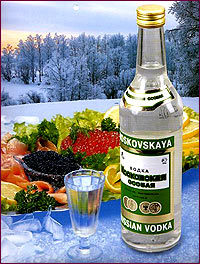 The
process of drinking is specific. The glasses of all company
members must be full, then somebody should propose a "toast"
- what for the company is going to drink this drink. "Toasts"
can vary from trivial "Na zdorovie" or "Budem
zdorovy" ("For our health") to any other wish
or somebody's desire: "Za udachu" ("For good
luck"), "Na dorozhku" (before leaving - "For
the way"), "Daj Bog ne v poslednij raz" ("Hopefully
it's not the last time when we drink, with God's help")
etc. After the toast people clink their glasses with each other
and drink their drinks. Everybody must finish his drink, otherwise
it means that he does not support the toast. The next toast
follows in 5-10 minutes. The
process of drinking is specific. The glasses of all company
members must be full, then somebody should propose a "toast"
- what for the company is going to drink this drink. "Toasts"
can vary from trivial "Na zdorovie" or "Budem
zdorovy" ("For our health") to any other wish
or somebody's desire: "Za udachu" ("For good
luck"), "Na dorozhku" (before leaving - "For
the way"), "Daj Bog ne v poslednij raz" ("Hopefully
it's not the last time when we drink, with God's help")
etc. After the toast people clink their glasses with each other
and drink their drinks. Everybody must finish his drink, otherwise
it means that he does not support the toast. The next toast
follows in 5-10 minutes.
Click
here to learn how to make drinks with Vodka. |

|
Events and holidays
 Easter
and Christmas are celebrated with midnight services, candlelight processions
and flourishings of folk art. Easter
and Christmas are celebrated with midnight services, candlelight processions
and flourishings of folk art.
In April St Petersburg celebrates Music Spring, an international
classical music festival, and the last 10 days of June feature the
White Nights, a time for general merrymaking and staying up late.
A film festival is held in Moscow in autumn in odd-numbered
years. The Russian Winter Festival is celebrated in St Petersburg,
Moscow and Novgorod from late December to early January, and includes
folklore shows and vodka.
The biggest Russian holiday is New Year (1 January). During the
Soviet time people were not allowed to celebrate Christmas (Russian
Christmas is 7 January), and New Year was the most cheerful holiday.
Its celebrated with presents, champagne and yet more vodka.
The next holiday is the Old New Year (13 January). Russians
had a different calendar before February 1918. The difference between
Julian (the old Russian) and Gregorian (European) calendars was 13
days, and after the Soviet government adopted Gregorian calendar Russians
started to celebrate many holidays twice: according to the new style
and the old one.
|
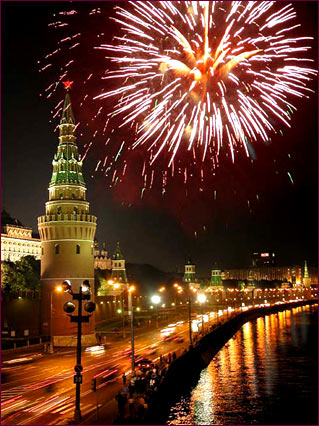 |

|
|
Attractions
Russia is a country with the long and unique history.
There are many places to see. Foreigners are usually impressed
with its unusual architecture,
especially churches and cathedrals. There are many museums,
monuments, and theatres. The most popular tourist destinations
are Moscow and St.
Petersburg. If you are in Russia, you should see at least
those two cities. Though they are so different from the rest
of the country that it would not be fair to say that you have
seen Russia until you have visited other places off the beaten
track.
Services
 Russians
call their services "non-obtrusive". Russians
call their services "non-obtrusive".
Be aware that toilets are difficult to find, and usually
you have to pay there.
To use a public phone you will need a token or card.
International calls can not be made from street phones. Your
mobile phone will work in Moscow and Saint Petersburg but
seldom in regional cities.
As a taxi you can use any car, not only a specific one. Drivers
are eager to give you a lift to earn a few rubles. Taxi fee
must be discussed with a driver before a journey.
To send e-mail you can use Internet cafes or official
postal services. Russia has become quite Internet savvy and
you will easy find a place with access to the Internet. The
best hotels will also provide you with this facility.
In the major cities you can rent a car but it's expensive.
Public transport in Russia is quite good, cheap and easy to
use though sometimes overcrowded.
Food
Restaurants and cafes offer a wide range of dishes,
and you will find something according your tastes. The only
problem you can face is that they seldom have a menu in English.
Tipping is expected but not mandatory. Check your bill before
paying, it is likely to have counting mistakes.
Russians are very fond of soups (which include meat,
vegetables and broth), pies and pelmeny (similar to ravioli).
Russian cuisine is not spicy. Portions are usually smaller
than you are used to. Click here to
read more about Russian food.
Crime Situation
 You
will be safe as long as you don't show around big amounts
of money or walk alone at night along dark lonely streets.
Murder is considered to be an extraordinary event in Russia
that usually happens with people who are involved in organized
crime. You can visit any place and peacefully walk on the
streets. However, you can easily become a victim of pocket
thefts; so take care of your wallet and do not keep big amounts
with you. You
will be safe as long as you don't show around big amounts
of money or walk alone at night along dark lonely streets.
Murder is considered to be an extraordinary event in Russia
that usually happens with people who are involved in organized
crime. You can visit any place and peacefully walk on the
streets. However, you can easily become a victim of pocket
thefts; so take care of your wallet and do not keep big amounts
with you.
|
 Acts
of terrorism, including bombings, have occurred in large Russian
cities over the last several years. Bombings have occurred at
Russian government buildings, hotels, tourist sites, markets,
residential complexes and on public transportation. While foreigners
have not been singled out in these attacks, travelers should
be alert for unusual behavior, unattended luggage in public
areas, and other possible indicators that something out of the
ordinary is in progress. Acts
of terrorism, including bombings, have occurred in large Russian
cities over the last several years. Bombings have occurred at
Russian government buildings, hotels, tourist sites, markets,
residential complexes and on public transportation. While foreigners
have not been singled out in these attacks, travelers should
be alert for unusual behavior, unattended luggage in public
areas, and other possible indicators that something out of the
ordinary is in progress. |
|
Demonstrations occasionally occur in large cities, and
sometimes in front of the U.S. embassy and consulates. While
these demonstrations are for the most part peaceful and controlled,
it is best to avoid such gatherings.

As a visitor to Russia, be alert to your surroundings.
To avoid highway crime, travelers should try not to drive
at night. Never sleep in vehicles along the road. Do not pick
up hitchhikers, who not only pose a threat to your physical
safety, but also put you in danger of being arrested for unwittingly
transporting narcotics or narcotics traffickers in your vehicle.
Your vehicle can be confiscated if you are transporting marijuana
or other narcotics.
Incidents of violent crime directed against homosexual
men have also been reported.
Extortion and corruption are common in the business
environment. Organized criminal groups target foreign businesses
in many cities and have been known to demand protection money
under threat of serious violence. Many western firms hire
security services that have improved their overall security,
although this is no guarantee. Small businesses are particularly
vulnerable. Since the mid-1990's, several American business
people have been attacked, kidnapped and even killed.
Travelers should be aware that certain activities
that would be normal business activities in the United States
and other countries are either illegal under the Russian legal
code or are considered suspect by the FSB (Federal Security
Service). Travellers should be particularly aware of potential
risks involved in any commercial activity with the Russian
military-industrial complex, including research institutes,
design bureaus, and production facilities or other high technology,
government-related institutions. Any misunderstanding or dispute
in such transactions can attract the involvement of the security
services and lead to investigation or prosecution for espionage.
Rules governing the treatment of information remain poorly
defined. During the last several years, there have been incidents
involving the arrest and/or detention of U.S. citizens. While
the U.S. embassy has had consular access to these individuals,
arrested Americans faced lengthy sentences -- sometimes in
deplorable conditions - if convicted.
|

|
Useful Info
• All foreigners visiting Russia will require a Russian
visa. To learn more about how to obtain Russian visa please
visit Russian
Embassy website.
• Official language is Russian, but English is taught at
all school levels. Signs in English are common on the streets
of Moscow and other big cities.
• All prices are generally quoted in rubles. Currency can
be freely converted at banks, hotels etc.
• Electricity throughout Russia is 220 volt/50 hz. The
plug is the two-pin thin European standard. Be sure to bring
your own converter as most places in Russia do not carry them.
• There are 11 time zones. Time is GMT +3 for both Moscow
& St. Petersburg.
• Quality of tap water varies from city to city but normally
is quite poor. It will be wise not to drink tap water, and use
bottled water for brushing your teeth. Be aware though, that
Russian mineral water is usually salted and has a special taste.
Buy imported water or ask a salesperson which one is not salted.
• Russians do not wear shoes at apartments, and usually
you will be offered to change your shoes to slippers. Even if
your hosts do not ask you to take off your shoes, do it yourself.
• It's polite to bring something with you when invited
for socials. Bring flowers for a hostess and you will never
be mistaken.
• It's not nice if you leave something on your plate when
eating at a private house and you can offend the hosts. If you
do not drink alcohol, at least take a glass and have a sip.
You are supposed to try every dish on the table so keep space.
Ask the person who invited you, how many dishes are in queue.
To learn more about travelling in Russia click
here.
Thinking about travelling to Russia? Check out Sokol
Travel Agency. |
|
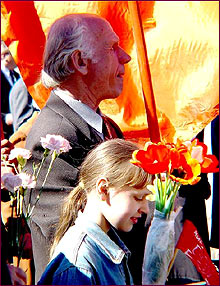 Non-official
"Men's Day" is 23 February, the Day of Army. All men in
Russia are liable for call-up (including reservists), so they all
are celebrities. On this day women usually give men small gifts. Non-official
"Men's Day" is 23 February, the Day of Army. All men in
Russia are liable for call-up (including reservists), so they all
are celebrities. On this day women usually give men small gifts.
Official "Women's Day" is March 8th. On this day
men give women gifts, usually flowers. Men also are supposed to do
all the housework, this is pretty nice - at least once a year women
can have some rest and forget about dishes, cooking, kids, take a
magazine and relax on the coach...
9 May is a Victory Day (over the Germans in the world war ll).
It's widely celebrated throughout the country.
12 June - the Independence Day. It's an official holiday but
Russians are not used to it yet. They spend this day on their "dachas"
- small plots in countryside where they plant some vegetables.

|
overview | lifestyle
| food and recipes
| kgb
| travel tips
|
|


 Easter
and Christmas are celebrated with midnight services, candlelight processions
and flourishings of folk art.
Easter
and Christmas are celebrated with midnight services, candlelight processions
and flourishings of folk art.  Non-official
"Men's Day" is 23 February, the Day of Army. All men in
Russia are liable for call-up (including reservists), so they all
are celebrities. On this day women usually give men small gifts.
Non-official
"Men's Day" is 23 February, the Day of Army. All men in
Russia are liable for call-up (including reservists), so they all
are celebrities. On this day women usually give men small gifts. Russia
is a beautiful country and you will enjoy your trip. At the
same time it's quite different from other tourist destinations
and you should plan your visit carefully.
Russia
is a beautiful country and you will enjoy your trip. At the
same time it's quite different from other tourist destinations
and you should plan your visit carefully. Winter
travels have their special charm, but you'd better don't try
if you are not used to subzero temperatures.
Winter
travels have their special charm, but you'd better don't try
if you are not used to subzero temperatures. 
 Aeroflot
has been broken up into many small airlines, leading to virtually
unregulated skies and the worst regional safety record in the
world. Flying within Russia is an unreliable, unpredictable
and difficult business. Try to get a seat on a domestic flight
that ultimately has an international destination, because these
carriers are certified to meet higher standards than domestic-only
services.
Aeroflot
has been broken up into many small airlines, leading to virtually
unregulated skies and the worst regional safety record in the
world. Flying within Russia is an unreliable, unpredictable
and difficult business. Try to get a seat on a domestic flight
that ultimately has an international destination, because these
carriers are certified to meet higher standards than domestic-only
services.

 Drinking
until one falls is all right. The parties usually take place
in private flats, and majority of the guests stay to sleep overnight
occupying all free space on coaches and the floor. The next
morning the party may continue. "The morning after the
night before" condition, named in Russian "pokhmel'ie",
is supposed to be cured by drinking a small amount of alcohol
("opokhmelitsya"). It does provide some relief but
thereafter people usually can't stop. Small shops on the streets
(kiosks) selling mostly alcohol and chocolate, work 24 hours
7 days a week, and the party can get extra drinks any time if
they think they do not have enough.
Drinking
until one falls is all right. The parties usually take place
in private flats, and majority of the guests stay to sleep overnight
occupying all free space on coaches and the floor. The next
morning the party may continue. "The morning after the
night before" condition, named in Russian "pokhmel'ie",
is supposed to be cured by drinking a small amount of alcohol
("opokhmelitsya"). It does provide some relief but
thereafter people usually can't stop. Small shops on the streets
(kiosks) selling mostly alcohol and chocolate, work 24 hours
7 days a week, and the party can get extra drinks any time if
they think they do not have enough.  Russian
drinking traditions are very much a cultural thing, and the
person who drinks and does not become drunk is always respected.
It's called "he can drink". The more you drink and
don't fall down drunk, the more your friends will respect you.
Many business deals are solved while drinking together, it's
probably one more reason why women don't succeed in making careers.
Russian
drinking traditions are very much a cultural thing, and the
person who drinks and does not become drunk is always respected.
It's called "he can drink". The more you drink and
don't fall down drunk, the more your friends will respect you.
Many business deals are solved while drinking together, it's
probably one more reason why women don't succeed in making careers. The
process of drinking is specific. The glasses of all company
members must be full, then somebody should propose a "toast"
- what for the company is going to drink this drink. "Toasts"
can vary from trivial "Na zdorovie" or "Budem
zdorovy" ("For our health") to any other wish
or somebody's desire: "Za udachu" ("For good
luck"), "Na dorozhku" (before leaving - "For
the way"), "Daj Bog ne v poslednij raz" ("Hopefully
it's not the last time when we drink, with God's help")
etc. After the toast people clink their glasses with each other
and drink their drinks. Everybody must finish his drink, otherwise
it means that he does not support the toast. The next toast
follows in 5-10 minutes.
The
process of drinking is specific. The glasses of all company
members must be full, then somebody should propose a "toast"
- what for the company is going to drink this drink. "Toasts"
can vary from trivial "Na zdorovie" or "Budem
zdorovy" ("For our health") to any other wish
or somebody's desire: "Za udachu" ("For good
luck"), "Na dorozhku" (before leaving - "For
the way"), "Daj Bog ne v poslednij raz" ("Hopefully
it's not the last time when we drink, with God's help")
etc. After the toast people clink their glasses with each other
and drink their drinks. Everybody must finish his drink, otherwise
it means that he does not support the toast. The next toast
follows in 5-10 minutes.
 Russians
call their services "non-obtrusive".
Russians
call their services "non-obtrusive".  You
will be safe as long as you don't show around big amounts
of money or walk alone at night along dark lonely streets.
Murder is considered to be an extraordinary event in Russia
that usually happens with people who are involved in organized
crime. You can visit any place and peacefully walk on the
streets. However, you can easily become a victim of pocket
thefts; so take care of your wallet and do not keep big amounts
with you.
You
will be safe as long as you don't show around big amounts
of money or walk alone at night along dark lonely streets.
Murder is considered to be an extraordinary event in Russia
that usually happens with people who are involved in organized
crime. You can visit any place and peacefully walk on the
streets. However, you can easily become a victim of pocket
thefts; so take care of your wallet and do not keep big amounts
with you.  Acts
of terrorism, including bombings, have occurred in large Russian
cities over the last several years. Bombings have occurred at
Russian government buildings, hotels, tourist sites, markets,
residential complexes and on public transportation. While foreigners
have not been singled out in these attacks, travelers should
be alert for unusual behavior, unattended luggage in public
areas, and other possible indicators that something out of the
ordinary is in progress.
Acts
of terrorism, including bombings, have occurred in large Russian
cities over the last several years. Bombings have occurred at
Russian government buildings, hotels, tourist sites, markets,
residential complexes and on public transportation. While foreigners
have not been singled out in these attacks, travelers should
be alert for unusual behavior, unattended luggage in public
areas, and other possible indicators that something out of the
ordinary is in progress.